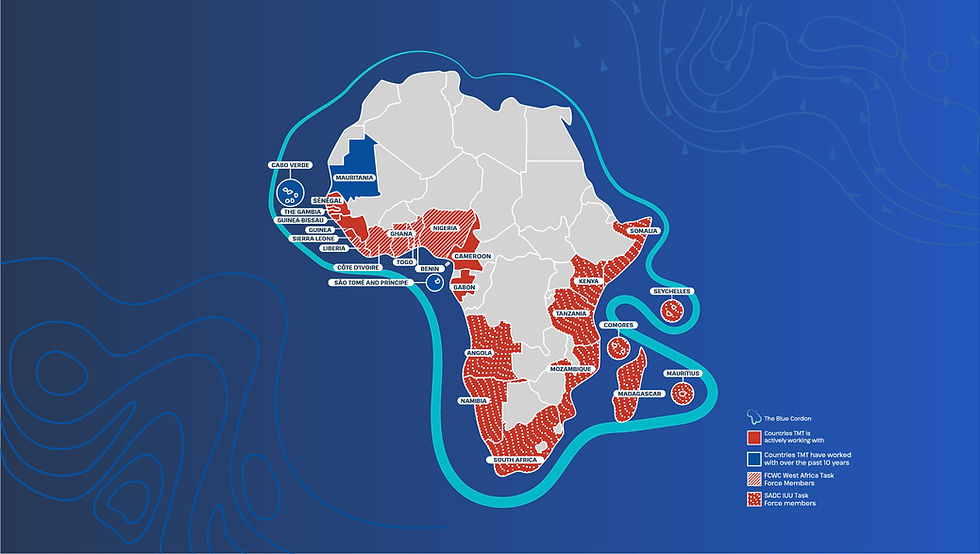Sub regional Joint Patrol between Togo-Benin
- Trygg Mat Tracking TMT
- Dec 16, 2021
- 3 min read
Abidjan, Côte d’Ivoire: December 12, 2021: The Fisheries Committee for the West Central Gulf of Guinea (FCWC), an intergovernmental organization with its headquarters in Tema, Ghana, announces the completion of its first subregional joint patrol operation Isaac Gatorwu, between Togo and Benin.
The pilot joint patrol is the first FCWC sub-regional patrol under the European Union-funded PESCAO project, with strong support provided by partners including CRESMAO, European Fisheries Control Agency (EFCA), Multinational Maritime Coordination Centres (MMCC) Zones E & F, and Trygg Mat Tracking with Norad funding.
The FCWC Secretariat held a series of preparatory coordinating meetings with the national agencies of Togo and Benin to finalize the operational order, focal points, and the communication strategy. A separate meeting was held with the partners to clarify roles and define the level and detail of support each partner would provide.
“We thank the governments and national agencies of Benin and Togo, and all our partners, for collaborating to make this joint patrol a reality. The realization of this joint patrol fulfils a key result in the FCWC PESCAO project, but also sends a loud and clear signal, that enforcement action and regional cooperation to combat IUU fishing to ensure safe, secure and legal fisheries is a goal that we are taking seriously in the FCWC region” says Seraphin Dedi, Secretary-General of the FCWC.
The joint patrol operation was validated by the Member States under the European Union-funded Improved Regional Fisheries Governance (PESCAO) project, to allow Member States to take enforcement actions from intelligence provided by and supplied to the Regional MCS Centre (RMCSC) that was launched earlier this year to monitor fishing activities across the region.
Duncan Copeland, TMT Executive Director said ‘We are very pleased to have been able to provide intelligence and operational support to this first regional fisheries patrol in the FCWC region. At sea patrols are a key component of effective fisheries enforcement, but only when well coordinated, well planned, and well informed. We congratulate the FCWC and the Regional MCS Centre for their leadership in making this a reality’.
The RMCSC has been operational since April 2020 and is located in the Fisheries Research Institute Building, in Tema, Ghana. For more information on the RMCSC, visit http://www.bit.ly/FCWCRMCSC.
Background
The Fisheries Committee for the West Central Gulf of Guinea (FCWC) is an intergovernmental body established in 2007, with a Secretariat hosted in Tema, Ghana. The FCWC facilitates cooperation in fisheries management between its member countries: Liberia, Côte d’Ivoire, Ghana, Togo, Benin, and Nigeria. The countries have several shared fish stocks and identified a need for cooperation and shared management of these resources.
For further information, please visit www.fcwc-fish.org
Information on PESCAO
The Programme for Improved Regional Fisheries Governance in Western Africa (PESCAO) is a five-year, European Union funded initiative, implemented with the Economic Community of West African States (ECOWAS) Commission. PESCAO has a budget of EUR 15 million and is running from 2018 to 2023. The objective of PESCAO is to enhance the contribution of fisheries resources to sustainable development, food security, and poverty alleviation in West Africa. FCWC Member States are benefiting from the FCWC PESCAO Project – direct support to the FCWC Secretariat from the larger programme – through component two for ‘building the capacities of competent national and regional MCS authorities to deter IUU fishing’.
RMCSC and WATF integration
Further support is being provided by the Norwegian Agency for Development Cooperation (Norad), ensuring the integration of the RMCSC and the FCWC West Africa Task Force (WATF).
The West Africa Task Force (WATF) established in 2015 under the Fisheries Intelligence and MCS Support in West Africa project funded by Norad. The WATF has operationalised key regional and international instruments to combat IUU fishing. It has strengthened regional information-sharing and cooperation between countries; interagency cooperation at the national level; and enforcement actions triggered by intelligence analysis and intelligence-sharing. The WATF has laid the foundation for longer term and sustained regional cooperation and increased fisheries compliance in the region. The WATF is facilitated by the FCWC Secretariat and supported by a Technical Team that includes Trygg Mat Tracking (TMT) and Stop Illegal Fishing (SIF).




